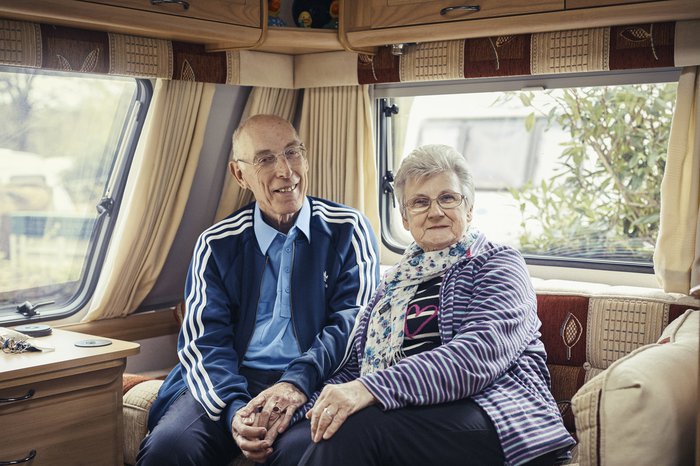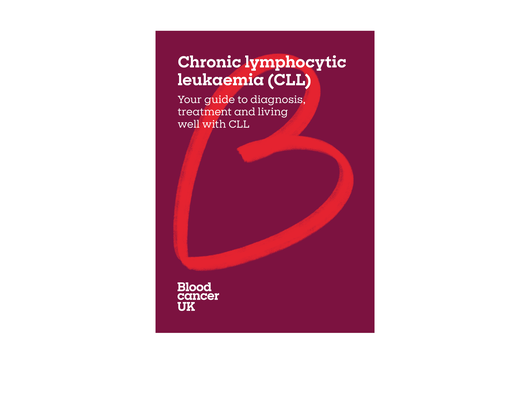Trevor and Elizabeth’s story
Supporting each other while we watch and wait
Just a year after getting the all clear from non-Hodgkin lymphoma (NHL), Trevor was placed on watch and wait for chronic lymphocytic leukaemia (CLL).

Just a year after getting the all clear from non-Hodgkin lymphoma (NHL), Trevor was told he had chronic lymphocytic leukaemia (CLL).
Trevor: To tell our story properly, we need to go back to 1989, when I was diagnosed with non-Hodgkin lymphoma. I discovered a lump on my head, which my doctor thought was probably a blocked gland. He told us to come back if it didn’t go away – which we did, some four months later – and he sent us immediately for a biopsy. We got a phone call from the hospital the same week, preparing us for a letter that was on its way from the Royal Marsden cancer hospital asking us to come in for an urgent appointment. They thought it was blood cancer.
Elizabeth (Trevor's wife): It was a shock; we’d only been married ten months and I’d lost my first husband to cancer ten years earlier. We went off to the Royal Marsden to have the usual tests and the consultant said: “We think it’s non-Hodgkin lymphoma, and have to warn you that there’s a chance it’s spread throughout your body."
We’re both Christians, and we went into a church that we’d never been into before, broken-hearted. During the service, the Pastor anointed Trevor with oil, and prayed for his healing. After three weeks of waiting for the results, the hospital called us in and told us the lymphoma was confined to Trevor’s head. It was a miracle! After three weeks of radiotherapy, you could see the lump disappearing.
He was seen by a consultant every three months, which gradually became six months, and then yearly – and eventually, after 20 years of monitoring, he was discharged.
Trevor: Our GP continued to take blood tests, and in 2011 – just a year after getting the all clear – we received a phone call from the surgery asking us to come and see her. She referred us back to the Marsden and while in the waiting area, we saw lots of notices on the walls about leukaemia…
Elizabeth: Taking all of this in, we were called in to see the consultant, Dr. Claire Dearden, who was very re-assuring. “What I’m about to tell you is going to be a shock, but I don’t want you to be worried,” she said. “You have a condition called chronic lymphocytic leukaemia – CLL for short – which is a form of leukaemia. It’s extremely unlikely that you’ll die from it, but we’re going to put you on something called ‘watch and wait’, which means that we’ll monitor you and wait to see if your condition changes. If that happens, we’ll start treatment – but not until then.”
Coming to terms with watch and wait
Trevor: I still can’t fully get my head around it – but, as the years have gone by, it’s become easier to accept… Fortunately, my condition hasn’t got any worse, so I can put it to the back of my mind. But when the six monthly checks come up, I do get anxious and irritable.
Elizabeth: Trevor’s always been a very gentle and patient person, but all of a sudden he started getting irritated by other drivers when we were out in the car. He did some research, and discovered that it’s not unusual for people with CLL to get more easily upset and irritable. So, rightly or wrongly, we’ve been putting this change in temperament down to his condition to a certain extent. And that’s made it easier to deal with.
Trevor: We just try to enjoy life and continue doing the things we love. We were naturists when I was first diagnosed with blood cancer, and naturism continues to be a big part of our lives. We’ve found it to be a really healthy lifestyle; physically, emotionally and spiritually (I’ve been chaplain at our local club since 1993). People often say that when they go through the club’s gates, they leave all their worries and fears behind.
Sport also plays a big part in my life. Exercise is very beneficial and it certainly helps to reduce anxiety.
I play miniten (like tennis, but on a smaller court) most Thursdays and Sundays at the club – and we both play boules.
Sources of support
Elizabeth: We’re lucky in that Trevor doesn’t need any extra practical or physical support from me at the moment. We do support each other emotionally – so much so that I don’t feel I need any additional practical or emotional support as Trevor’s spouse. But, should I need it in the future, I know I could go to our wonderful GP, Blood Cancer UK or the CLL Support Association.
Trevor: But we also feel it’s important to share what’s happening with our friends and family. So we have support if and when we need it.
Elizabeth: Yes, none of this is kept to ourselves. A little while ago, we were due to stay with Trevor’s eldest son, Paul, for his little boy’s baptism. Paul knew that Trevor shouldn’t be among infectious illnesses, so he kindly phoned and told us his son was recovering from chickenpox. I rang Lucy, our clinical nurse specialist at the Marsden, to double check, and she said we were fine to go – but we wouldn’t have known that, had it not been for those phone calls.
Trevor: I think hope is also very important. There are new drugs being researched and coming on the market all the time. And the fact that we’re both committed Christians has also helped us come to terms with this. We want to stick to this life for as long as possible, but if you believe in an afterlife, it takes away some of the concern and the worry.
Elizabeth: Thinking that far down the line is something I still find very difficult, but we do have a lot to be thankful for. When we go to the Marsden for Trevor’s six monthly blood tests, we thank God that he’s still stable and enjoying life.
Your guide to CLL
This free booklet covers:
- finding out you have CLL
- understanding CLL
- coping with watch and wait
- treatment options
- living well with CLL
- real stories of people living with CLL
You can order it for free from our online shop.

